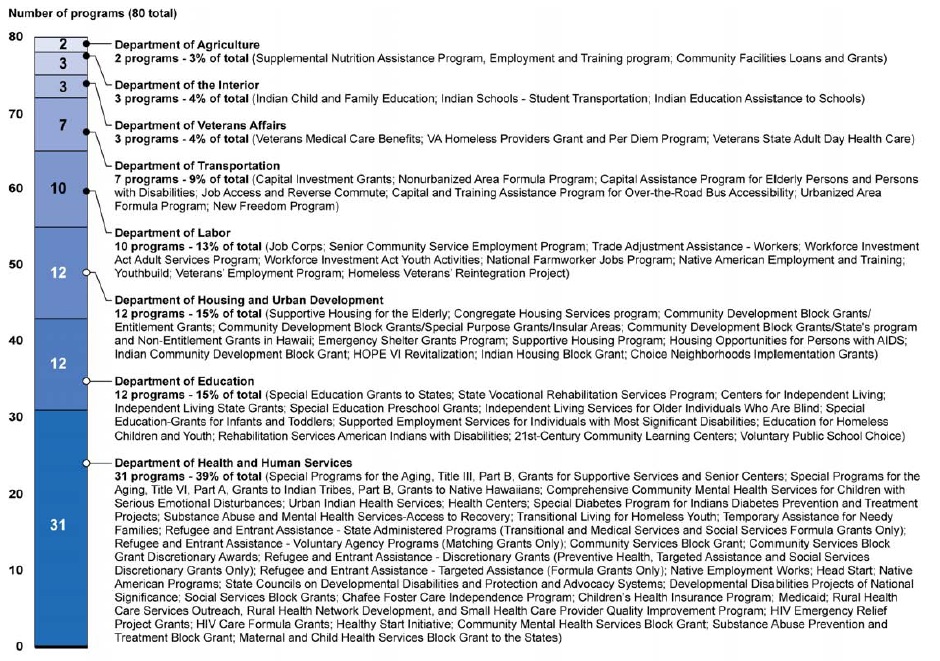GOVERNMENT ACCOUNTABILITY OFFICE
What G.A.O. Found
Eighty federal programs are authorized to fund transportation services for the transportation disadvantaged, but transportation is not the primary mission of most of the programs GAO identified. Of these, the Department of Transportation administers 7 programs that support public transportation. The remaining 73 programs are administered by 7 other federal agencies and provide a variety of human services, such as job training, education, or medical care, which incorporate transportation as an eligible expense in support of program goals. Total federal spending on transportation services for the transportation disadvantaged remains unknown because, in many cases, federal departments do not separately track spending for these services. However, total funding for the 28 programs that do track or estimate transportation spending, including obligations and expenditures, was at least $11.8 billion in fiscal year 2010.
The interagency Coordinating Council on Access and Mobility, which the Secretary of Transportation chairs, has led governmentwide transportation coordination efforts since 2003. The Coordinating Council has undertaken a number of activities through its “United We Ride” initiative aimed at improving coordination at the federal level and providing assistance for state and local coordination. For example, its 2005 Report to the President on Human Service Transportation Coordination outlined collective and individual department actions and recommendations to decrease duplication, enhance efficiencies, and simplify access for consumers. Key challenges to federal interagency coordination efforts include a lack of activity at the leadership level of the Coordinating Council in recent years—the Coordinating Council leadership has not met since 2008—and the absence of key guidance documents for furthering agency coordination efforts. For example, the Coordinating Council lacks a strategic plan that contains agency roles and responsibilities, measurable outcomes, or required follow-up. GAO has previously reported that defining and articulating a common outcome and reinforcing agency accountability through agency plans and reports are important elements for agencies to enhance and sustain collaborative efforts.
State and local officials GAO interviewed use a variety of planning and service coordination efforts to serve the transportation disadvantaged. Efforts include state coordinating councils, regional and local planning, one-call centers, mobility managers, and vehicle sharing. For example, state coordinating councils provide a forum for federal, state, and local agencies to discuss and resolve problems related to the provision of transportation services to the transportation disadvantaged. In other examples, one-call centers can provide clients with transportation program information and referrals for appropriate service providers and mobility managers may serve many functions—as policy coordinators, operations service brokers, and customer travel navigators. However, state and local governments face several challenges in coordinating these services—including insufficient federal leadership, changes to state legislation and policies that may hamper coordination efforts, and limited financial resources in the face of growing disadvantaged populations.
Download report (PDF): Transportation-Disadvantaged Populations
About the GAO
www.gao.gov
“The U.S. Government Accountability Office (GAO) is an independent, nonpartisan agency that works for Congress. Often called the “congressional watchdog,” GAO investigates how the federal government spends taxpayer dollars. The head of GAO, the Comptroller General of the United States, is appointed to a 15-year term by the President from a slate of candidates Congress proposes. Gene L. Dodaro became the eighth Comptroller General of the United States and head of the U.S. Government Accountability Office (GAO) on December 22, 2010, when he was confirmed by the United States Senate. He was nominated by President Obama in September of 2010 and had been serving as Acting Comptroller General since March of 2008.”
Tags: GAO, Government Accountability Office, US Government Accountability Office







 RSS Feed
RSS Feed